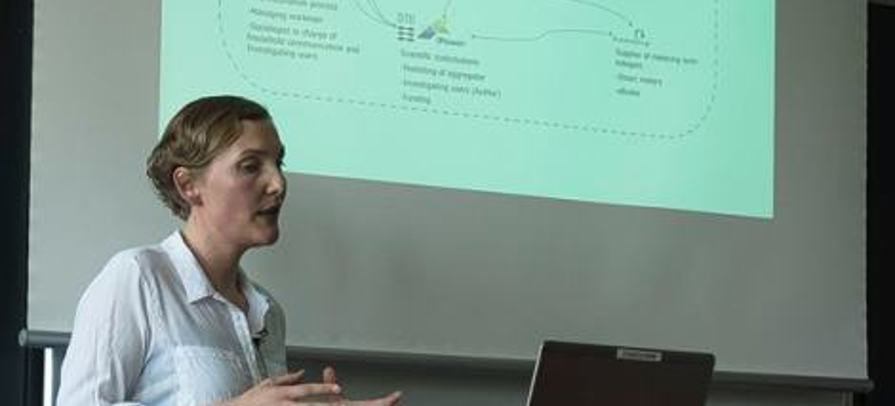Meiken Hansen vart ph.d. á DTU
Fríggjadagin 13. mai vardi Meiken Hansen ph.d. ritgerð sína á DTU MAN. Ritgerðin hevur heitið ”Smart grid development and households in experimental projects”.
Meiken Hansen hevur verið innskrivað til ph.d lestur á DTU Management Engineering – Technology and Innovation Management division.
Høvuðsvegleiðari hevur verið Mads Borup og hjávegleiðarin Bettina Hauge, bæði frá DTU MAN.
Í metingarnevndini vóru Yutaka Yoshinaka, lektari, DTU Management Engineering, Eva-Karin Heiskanen, Granskingarstjóri, University of Helsinki og Toke Haunstrup, lektari, Aalborg Universitet
Kristian Borch seniorgranskari á DTU MAN leiddi verjuna.
Les um Meiken Hansen í Heilagrunninum
Enskur samandráttur
The use of renewable energy has become of great interest to the Danish government as it would allow Denmark to become independent of fossil fuels. One of the stated ambitions is that, in 2020, 50% of Denmark´s electricity will come from wind energy. Such changes constitute a significant challenge to the electricity grids and call for the development of smart grids. The Danish Smart Grid Strategy states that ‘flexible electricity consumption’ is the main purpose of smart grids in Denmark, envisioning that future consumers will have flexible consumption of electricity. Thus, they are expected to respond to the supply side and consume energy when it is available.
The goal of this thesis is to investigate how household consumers are integrated in smart grid development activities. More specifically, it focuses on household consumers, as they are represented in experimental projects in the smart grid area. This is done by building theoretically on the concept of scripts (Akrich, 1992) and on Practice theory (Shove et al., 2009; Schatzki, 2002; Reckwitz, 2002). Empirically, the focus is primarily on development activities in Denmark. The overall research question of the thesis is: How are households in the smart grid being envisioned in experimental projects, and how are they responding to these visions?
This thesis increases the understanding of the visions of smart grids and household consumers and of how they actually are responding to smart grid technologies and concepts. Particular attention has been given to overall visions in experimental projects, the new emerging practices related to the new role of being a prosumer, and lastly, the issues of control.
The results of the first paper show that, although flexible consumption may entail large changes in households’ everyday activities, there has been little research on the area in Danish smart grid experimental projects. Overall, the consumers are expected, to some extent, to provide flexibility by changing their energy-consuming practices because of economic incentives by means of manual or automated control of devices. Moreover, the Danish smart grid development community is not acknowledging the role of prosumers in the grid, although the perspective of prosumers might play a role in the transition towards a fossil-free energy system.
The following two papers address the issue of household consumers and everyday life aspects in smart grid households and find that there is a contradiction between the common Danish smart grid script and the role of prosumers. Furthermore, the concept of ‘remote control’ contradicts the rhythm of the practices of everyday life that prosumers strive for in the current PV tariff structure.
